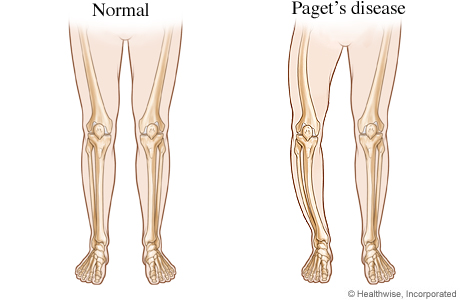Bowed Legs from Paget’s Disease
Current as of: November 6, 2018
Author: Healthwise Staff
Medical Review:Anne C. Poinier, MD – Internal Medicine & Kathleen Romito, MD – Family Medicine & Matthew I. Kim, MD – Endocrinology, Diabetes and Metabolism
The abnormal breakdown and replacement of bone tissue in Paget’s disease may lead to bone deformities such as bowed legs as shown in the picture. Paget’s disease may also lead to an enlarged skull or hips or a curved backbone. Deformities are more common in long bones, such as the thighbone (femur). A bone affected by…
Current as of: November 6, 2018
Author: Healthwise Staff
Medical Review:Anne C. Poinier, MD - Internal Medicine & Kathleen Romito, MD - Family Medicine & Matthew I. Kim, MD - Endocrinology, Diabetes and Metabolism
11/06/2018
This information does not replace the advice of a doctor. Healthwise, Incorporated, disclaims any warranty or liability for your use of this information. Your use of this information means that you agree to the Terms of Use. Learn how we develop our content.


The abnormal breakdown and replacement of bone tissue in Paget’s disease may lead to bone deformities such as bowed legs as shown in the picture. Paget’s disease may also lead to an enlarged skull or hips or a curved backbone. Deformities are more common in long bones, such as the thighbone (femur).
A bone affected by Paget’s disease can cause complications. For example, if the upper leg bows, it may change how the bones that form the hip joint and knee joint fit together and move, leading to osteoarthritis. Osteoarthritis, in turn, can cause pain and stiffness in the joints and difficulty with walking and other daily activities.
Current as of: November 6, 2018
Author: Healthwise Staff
Medical Review:Anne C. Poinier, MD – Internal Medicine & Kathleen Romito, MD – Family Medicine & Matthew I. Kim, MD – Endocrinology, Diabetes and Metabolism
This information does not replace the advice of a doctor. Healthwise, Incorporated, disclaims any warranty or liability for your use of this information. Your use of this information means that you agree to the Terms of Use. Learn how we develop our content.
Current as of: November 6, 2018
Author: Healthwise Staff
Medical Review:Anne C. Poinier, MD - Internal Medicine & Kathleen Romito, MD - Family Medicine & Matthew I. Kim, MD - Endocrinology, Diabetes and Metabolism
11/06/2018
This information does not replace the advice of a doctor. Healthwise, Incorporated, disclaims any warranty or liability for your use of this information. Your use of this information means that you agree to the Terms of Use. Learn how we develop our content.
